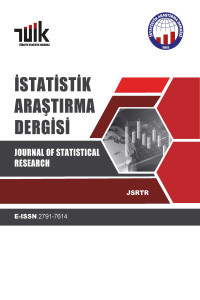Ankara İlinde Gelir Farklılıklarını Belirleyen Etmenler
Bu çalışmada Ankara ilindeki gelir farklılıklarını belirleyen faktörler analiz edilmiştir ve seçim sapması ele alınmıştır. Yapılan analizler, insan sermayesi unsurlarından eğitim düzeyinin arttırılmasının kazanç eşitsizliklerini azaltan önemli bir etmen olduğunu ortaya koymuştur.
Anahtar Kelimeler:
Temel İnsan Sermayesi, Gelir Eşitsizliği, Eğitimin Getirisi, Seçim Sapması
The Factors that Determine the Income Inequality in Ankara
In this study, the factors that effects the income inequality in Ankara is analysed and it is dealt with the selectivity bias. The analysis we perform in this study show that the increase in the level of education, which is an important element of human capital, leads to reduction of income inequality.
___
- BECKER G.S., (1964), Human Capital, a Theoretical and Emprical Analysis with Special Reference to Education, Columbia University Press, New York and London.
- CATSIAPIS, G., (1982), Sample Selection Bias with Multiple Selection Rules, an Application to Student Aid Grants, Journal of Econometrics, 18:351-368.
- CHISWICK, B. R., (1974), Income Inequality, National Bureau of Economic Research, New York.
- CHISWICK, B. R., (1977), "Sons of Immigrants: Are They At An Earnings Disadvantage?", American Economic Review, Feb. Vol 67, No 1: 376-380.
- DAYIOĞLU, M., (1995), Earnings Inequality Between Genders in Turkey, Yayınlanmamış Doktora Tezi, ODTÜ, Sosyal Bilimler Enstitüsü, Ankara.
- FISHLOW, A., (1972), "On The Emerging Problems of Development Policy, Brazilian Size Distribution of Income", American Economic Association, Vol 62: 391-402.
- GREENE, W.H., (1993), Econometric Analysis, Second Edition, New York University, Macmillian Publishing Company, New York.
- GRONAU, R., (1974), "Wage Comparisons – A Selectivity Bias, Journal of Political Economy”, Vol 82, No 6: 1119-1143.
- HALVORSEN R., R. Palmquist, (1980), "The Interpretation of Dummy Variables in Semilogaritmic Equations", American Economic Review, Vol 70: 474-475.
- HECKMAN, J.J., (1979), "Sample Selection Bias as a Spesification Error", Econometrica, Vol 47, No1: 153-161.
- KASNAKOĞLU, Z., (1978), "A Simultaneous Model Approach to the Determinants of Male Earnings Differentials in Turkey for 1968", the Review of Economics and Statistics, 60, May, 307-312.
- KASNAKOĞLU, Z.,H. Çıngı, (1980), "Öznel Meslek Saygınlığı Üzerine Bulgular, Ankara, 1977", ODTÜ Gelişme Dergisi, 7(3-4): 317-360.
- KASNAKOĞLU, Z.,(1982), "Yarı Logaritmik Modellerde Kukla (Dummy) Değişkenlerin Yorumlanması Üzerine Bir Not", ODTÜ Gelişme Dergisi, 9(3-4): 535-541.
- KASNAKOĞLU, Z.,M., Dayıoğlu, (1997), "Kentsel Kesimde Kadın ve Erkeklerin İşgücünü Katılımları ve Kazanç Farklılıkları", ODTÜ Gelişme Dergisi, 24(3): 329-361.
- LAYARD, R., G. Psacharopoulos, (1974) The Screening Hypothesis and the Returns to Education, Journal of Political Economy, Vol 82, No 5: 985-998.
- LEWİS, H. G., (1974), "Comments on Selectivity Biases in Wage Comparisons", Journal of Political Economy, Vol 82, No 6: 1145-1155.
- MADDALA, G., (1990), Limited Dependent and Qualitative Variables in Econometrics, Econometric Society Monographs, No. 3, Cambridge University, USA.
- METİN, K., Ş. Üçdoğruk, (1997), "İstanbul İlinde Gelir Farklılıklarını Belirleyen Etmenler: İnsan Sermayesi Modeli (1994)", Ekonomik Yaklaşım Dergisi, Cilt 8, Sayı 27: 283-302, Ankara.
- PİNDYCK, R. S., D. L. Rubinfeld, (1991), Econometric Models and Economic Forecasts, McGraw-Hill International Editions, Economic Series, Third Edition.
- SMİTH, J. P., F.R. (1997), Welch, "Black-White Male Wage Ratios: 1960-70", American Economic Review, June, Vol 67, No 3: 323-338.
- TACHİBANAKİ, T., (1980), "Education, Occupation and Earnings, a Recursive Approach for France", European Economic Review, 13: 103-127.
- TANSEL A., (1994), Wage Employment, Earnings and Returns to Schooling for Men and Women in Turkey, Economics and Education Review, Vol 13, No 4: 305-320.
- TANSEL, A., (1997), "Self Employment, Wage Employment and Returns to Education for Urban Men and Women in Turkey", ODTÜ İktisat Kongresi, Ankara.
- TUNÇ, M., (1997), Kalkınmada İnsan Sermayesi Yaklaşımları ve Türkiye’de İnsan Sermayesi Boyutunun Analizi, Yayınlanmamış Doktora Tezi, DEÜ, Sosyal Bilimler Enstitüsü, İzmir.
- WALES, T. S., A. D. Woodland, (1980), Sample Selectivity and The Estimation of Labor Supply Function, International Economic Review, June, Vol 21, No 2: 437-468.
- DİE, (1997), 1994 Hanehalkı Gelir Dağılımı Anketi Sonuçları, Devlet İstatistik Enstitüsü Matbaası, Eylül, Ankara.
- ISSN: 1303-6319
- Başlangıç: 2002
- Yayıncı: TÜİK
Sayıdaki Diğer Makaleler
Ankara İlinde Gelir Farklılıklarını Belirleyen Etmenler
Küçük Alan Tahminlerinde Sentetik Kestiriciler ve Özellikleri
E. Arzu KANIK, Handan ÇAMDEVİREN, Fikret GÜRBÜZ
Kardiyolojik Verilerin Doğrusal Olmayan Kanonik Korelasyon Analizi ile İncelenmesi
Mevlüt TÜRE, Necdet SÜT, Gültaç ÖZBAY, Turhan KÜRÜM
Handan ÇAMDEVİREN, E. Arzu KANIK, Fikret GÜRBÜZ
Varyansı Bilinmeyen Normal Dağılımlı Kitlenin Ortalamasının Ardışık Tahmini
